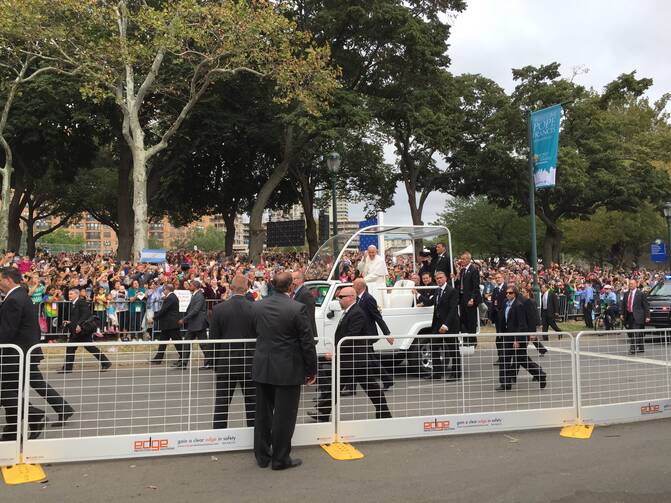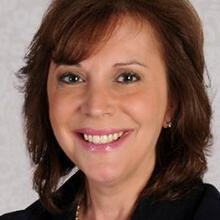As a young reporter at The Washington Post, I was assigned to follow a group of people at a suburban Maryland parish as they prepared for a visit of Pope John Paul II to Washington. I kept in touch with them throughout the visit and afterward to see what, if any effect, the pope’s visit had on their daily lives. When the NPR station I now work for asked me if I wanted to cover any part of Pope Francis’ recent visit, I immediately set out to find a group of pilgrims traveling from our area in central Illinois to see the pope. I knew it would be far more interesting covering ordinary people than being crammed in with the press at any of the official events.
A friend was planning to travel to Philadelphia from rural Roanoke, Ill., with a group from her parish. I was invited to tag along. Roanoke is a largely farming community about 20 miles from Peoria whose only industry consists of a couple of service stations and a furniture store. Catholics are a distinct minority there among Apostolic Christians, Lutherans, Mennonites and Methodists. Most Catholics are descendants of Italian immigrants who arrived in the early part of the 20th century to work in the coal mines, now closed.
Excitement ran high as our group gathered beneath a three quarter moon to fill a jumbo van with our suitcases and snack bags for the 14- hour drive to Philadelphia. Our group included a 19-year-old student from Chicago’s DePaul University, traveling with her mother, an insurance agent, an information technology specialist, the owner of a gardening business, two nurses, two teachers, an ordained deacon and his wife. Our oldest member was Leticia Hill, 78, “same age as the pope,” she proudly told everyone, who was born in the Philippines, but spent most of her life in the United States.
Small and rural though it may be, Roanoke offers a microcosm of the challenges this “People’s Pope” faces as he tries to minister to the vast tent known as the Catholic Church. Some in the group are divorced or have children who are divorced. One of the pilgrims is a woman who married her partner of 15 years in a civil union. They are raising two foster children. Theirs is just the sort of non-traditional family that is increasing filling the Sunday pews.
Our group also illustrates vividly that Catholics don’t represent any clearly defined voting bloc. Mary Jo Roseman describes herself on the political spectrum as landing somewhere between a “conservative Democrat and a liberal Republican” (if there is still such a thing!). “I am for social justice and helping the poor,” she told me as we stood along the parade route on Benjamin Franklin Parkway waiting for Pope Francis to pass.
But ask her about same sex marriage. “We have a sacrament of marriage and that is between a man and a woman because that is what works. It’s natural law. Our bodies are designed physically to be with a man or a woman.”
Still, Roseman isn’t unlike Pope Francis, who famously said when asked early in his papacy about homosexuality, “Who am I to judge?” On our trip, she was just as considerate and friendly with the gay woman as any of the rest of us. “I have family and friends who are gay,” she told me. “I would never be rude or mean to someone who believes differently.” Her beef is not with homosexuals. However, she draws a line when it comes to defining a same sex union as a “marriage.”
A more troubling conversation came with the deacon on the trip. He asked me if I had ever attended a same sex wedding. I told him yes. In fact, my husband, an Illinois Circuit Court Judge, had officiated at the wedding of two female friends. I told him my friends are two of the most Christ-like people I know. The deacon said he would never attend a same sex wedding. That would be “condoning sin.” I asked him to cite one place in the New Testament where Jesus talks about homosexuality. “He says, ‘Sin no more,’” the deacon says. I point out that reference is a bit vague and could refer to a variety of things. The deacon says, “Well, Sodom and Gomorrah!”
I asked if he knows any gay people personally. Yes, he assured me. But I doubt he does. I also doubt he knew that there was a gay woman in our group married to her partner. She is an active member of her Catholic parish in Peoria. She and her partner are raising two children who would otherwise be living with an abusive and alcoholic mother. I wanted to ask the deacon, “Where is the sin in that?”
On his visit, the pope met privately with a gay couple, and with Kim Davis, the Kentucky clerk who went to jail rather than issue same sex marriage licenses. There is something to learn from those gestures. The pope often stresses personal encounters. I think he is saying we need to discuss these matters person to person. Gay marriage and religious freedom aren’t merely “issues.” They are about individual lives. Stark delineations of “should” and “shouldn’t,” what is “never” right and what is “always” right have to give way to a much more personal exploration if we are to become a church that speaks to the families of today and of tomorrow.
I also came away from my travels with the Roanoke pilgrims with a greater sense of urgency that Pope Francis and the bishops must truly pray for guidance over the current teaching on divorce. We couldn’t get close enough to the Papal Mass to receive communion. But our deacon, who served as a Eucharistic minister at the Mass, was able to bring us communion later. One of the most moving experiences of the trip was receiving the Eucharist with my fellow pilgrims at an ad hoc communion service, presided over by the deacon, in the parking lot of a gas station outside of Philadelphia. I noticed, though, that the organizer of our trip declined to take the host. She told me later she doesn’t take communion because she is divorced and remarried. This is a woman who has led local high school kids on mission trips to places such as New Orleans and the Rio Grande Valley 17 times, who is there whenever her parish needs volunteers. Is her sin of remarrying outside the church so great that it should keep her from the very essence of the faith, the presence of Jesus in the Eucharist?
One of the most heartfelt pleas for change in the teaching on divorce came from a man on the trip who is married, has two children and has never been divorced. “Communion is the forefront of our faith,” Trent Monge told me. “Sin is part of humankind, of mankind. And one of the things that can help us through that is receiving the Eucharist. Whether a marriage ended, whatever the circumstance, communion is something that can help us through those things.”
As the bishops reconvene with the pope to continue the discussion on the Catholic family, they might think about Monge’s words. Communion as a way of helping people through struggles, not as a way of shunning.
Monge teaches a class for Confirmation students. Many of them, he says, struggle to understand the church’s teachings. He tells them it is okay to question and says he points to Pope Francis’ message of mercy.
“There are a number of things about the faith that I personally feel are a bit of a contradiction,” Monge says. “I have always been raised and told that my God is loving, forgiving God, and at times I believe the church doesn’t necessarily portray that.”
I am sure there are other spiritual struggles in the lives of my fellow pilgrims that I did not hear about in our brief four days together. Do we, as a church, stand for a loving, forgiving God? Pope Francis presides over a big tent. In the months ahead, will he open its door wider? Will he say once again, “Who am I to judge?”








